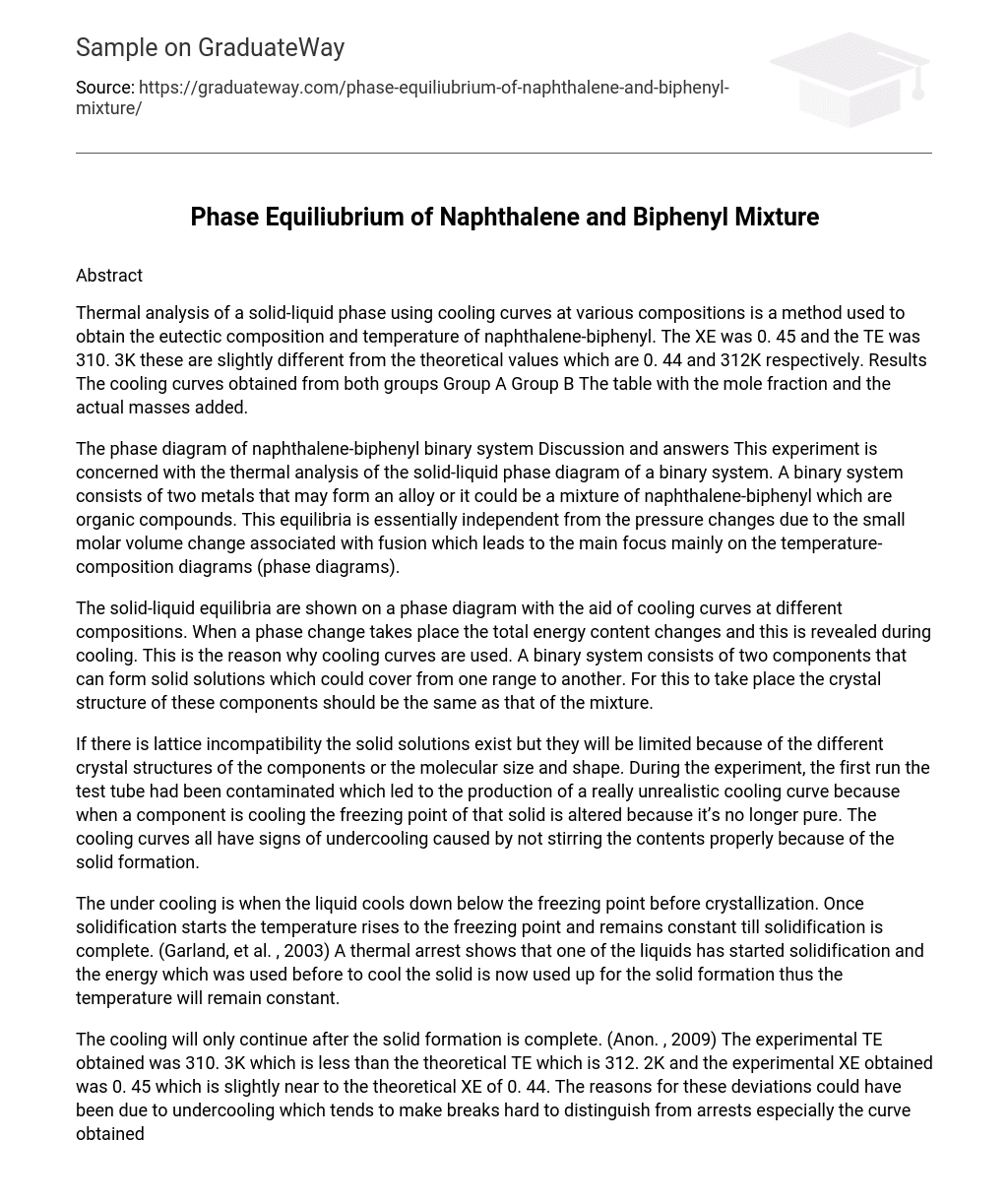Abstract
Thermal analysis of a solid-liquid phase using cooling curves at various compositions is a method used to obtain the eutectic composition and temperature of naphthalene-biphenyl. The XE was 0. 45 and the TE was 310. 3K these are slightly different from the theoretical values which are 0. 44 and 312K respectively. Results The cooling curves obtained from both groups Group A Group B The table with the mole fraction and the actual masses added.
The phase diagram of naphthalene-biphenyl binary system Discussion and answers This experiment is concerned with the thermal analysis of the solid-liquid phase diagram of a binary system. A binary system consists of two metals that may form an alloy or it could be a mixture of naphthalene-biphenyl which are organic compounds. This equilibria is essentially independent from the pressure changes due to the small molar volume change associated with fusion which leads to the main focus mainly on the temperature-composition diagrams (phase diagrams).
The solid-liquid equilibria are shown on a phase diagram with the aid of cooling curves at different compositions. When a phase change takes place the total energy content changes and this is revealed during cooling. This is the reason why cooling curves are used. A binary system consists of two components that can form solid solutions which could cover from one range to another. For this to take place the crystal structure of these components should be the same as that of the mixture.
If there is lattice incompatibility the solid solutions exist but they will be limited because of the different crystal structures of the components or the molecular size and shape. During the experiment, the first run the test tube had been contaminated which led to the production of a really unrealistic cooling curve because when a component is cooling the freezing point of that solid is altered because it’s no longer pure. The cooling curves all have signs of undercooling caused by not stirring the contents properly because of the solid formation.
The under cooling is when the liquid cools down below the freezing point before crystallization. Once solidification starts the temperature rises to the freezing point and remains constant till solidification is complete. (Garland, et al. , 2003) A thermal arrest shows that one of the liquids has started solidification and the energy which was used before to cool the solid is now used up for the solid formation thus the temperature will remain constant.
The cooling will only continue after the solid formation is complete. (Anon. , 2009) The experimental TE obtained was 310. 3K which is less than the theoretical TE which is 312. 2K and the experimental XE obtained was 0. 45 which is slightly near to the theoretical XE of 0. 44. The reasons for these deviations could have been due to undercooling which tends to make breaks hard to distinguish from arrests especially the curve obtained in run 4 by group B. the errors could have been to the wrong use of the apparatus especially the probe had to be placed on the walls of the test tube this could lead to the wrong temperature being recorded. The other error could have occurred due to the other solids sticking to the rod and then distorting the readings. When solid solubility exists it is often hard to obtain the true solidus from cooling curves this is because it is hard to obtain the solid-liquid equilibrium which requires a continuous variation in the composition of the solid. Bunnell, et al., n. d. )
References
- Anon., 2009. Lead or Tin Phase diagrams. [Online] Available at: http://www. sanjose. edu/labnotes/tech25 [Accessed 09 April 2013].
- Bunnelle, W. H., Meyer, L. A; Glaser, R. E., n. d. Recrystallization and Melting Point Determination. [Online] Available at: www.chem.missouri.edu/…/Recrystallization%20notes.doc [Accessed 09 April 2013].
- Garland, C. W., Nibler, J. W. & Shoemaker, D. P., 2003. Experiments in Physical Chemistry. 7th Edition ed. New York: McGraw-Hill Higher Education.





